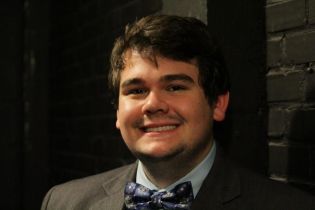The Leadership Columbia Class of 2017 is a group of 58 emerging and existing leaders in the region, who are dedicated to bettering themselves and their community. The 10-month skills-building program provides an educational experience with a strong emphasis on social and community awareness, while challenging the candidates to step out of their comfort zones and become involved in Columbia.
The Leadership Columbia Advisory Board, an alumni-based committee, organizes nine full-day class days, an orientation and a two-day retreat for the class. These class days focus on timely topics in our region ranging from economic development to criminal justice.
On Tuesday, January 10, current LC17 candidate Bob Evans wrote a post detailing his experience during the class' Economic Development Day:
"Take good notes, because you have to write a blog about this."
That was my mantra last Tuesday, as our Leadership Columbia class descended on the Amazon facility out in West Columbia. This month's class day was "Economic Development," the process by which a community improves the socio-economic quality of life for its citizens.
I came in with a basic understanding, but I left with boundless reasons why the Midlands – and South Carolina – means good business.
Like I said, our day began at the Amazon distribution center – a sprawling, 1.3 million-square-foot facility. We were instructed to leave our cell phones in our cars and I learned we were one of only a handful of groups permitted to tour the building in a given year.
Kind of reminds you of a certain fantastical chocolate factory, right?
No golden ticket necessary.
Our guides led us through every section of their workspace at the brisk pace of 2 steps per second (company policy). Having once worked at a similar center for the Home Shopping Network, I was familiar with the overall workflow, but absolutely blown away by the scope. One employee mentioned that, in a given shift, approximately 400 people might be working in a section, but you might only see one or two. Such is the nature of a job where you're spread out in a space equal to, like, 15 football fields.
We heard from two thought leaders that morning. Kiosha Boyles, president of Digitize Marketing, spoke about building our brand and claiming our name. "Your personal brand is your professional reputation. Take control of it and ensure it reflects who you are." This is near and dear to me, since I share my name with a well-known restaurant. It can be hard to be heard among the crowds of content online, but by emphasizing our authenticity and positive traits, she encouraged us to infuse our personality into our professional presence. Next, Ford Graham of the SC Department of Commerce noted that Charleston has the fastest growing major US port, and that South Carolina attracts the second-most international companies to our state. We're also number one in production of lawn mowers – did you know that the Husqvarna Group's SC workforce is 80% female?
Who run the world? Girls.
We left the Amazon facility just before noon, and after furiously texting, tweeting, and replying to emails, we reconvened at the downtown offices of Haynsworth Sinkler Boyd, P.A. to continue our discussions of economic development in the Midlands.
Our class heard from impactful people throughout the day, each of them making the case for business growth in South Carolina, and all of them throwing out more morsels of information than gobstoppers on an assembly line. Mercifully, they were also intelligent, engaging speakers who are passionate about the Midlands, so it was easy to find common ground.
Will Johnson of Haynsworth Sinkler Boyd, had the distinct pleasure of explaining property taxes, millage rates, SSRCs/FILOTs (‘special source revenue credits' and ‘fees in lieu of taxes') and all of the thrilling nuances of the tax code.
After the initial shell shock wore off, I learned a lot: Columbia's property taxes are high because we have a lot of untaxed land owned by churches, nonprofits, and the government. High rates can be a barrier when encouraging companies to choose the Midlands, but tax incentives allow us to be more competitive.
The rest of the speakers for the day all came back to several key points:
- SC offers state-funded, comprehensive workforce training for companies that meet certain employment/profit thresholds
- Columbia is good for business, though our current incentives are geared towards manufacturing
- USC is doing its part to draw the technology industry through its incubator and key partnerships with IBM and Boeing
- Economic development is a team sport, and there are lots of groups who need to work together to attract business
We as individuals can help by pushing to repair and maintain our infrastructure, by presenting a unified, positive voice for the Midlands, and realizing that though growth is slow, we need to be prepared for it. Columbia is one of the most connected cities in the Southeast in terms of interstate access; we can capitalize on that.
For my classmates in Leadership Columbia, I'd like to challenge us to use everything we've learned about the Midlands so far – education, arts and culture, political systems – and everything we will learn to make an effective case for the culture and community that we have here. It's up to us to make connections. Our class project is rooted in the idea that Columbia is stronger together through any adversity. Let's do everything we can to make our city succeed.
And I definitely have a newfound appreciation for online shopping.
Bob Evans, Leadership Columbia Class of 2017